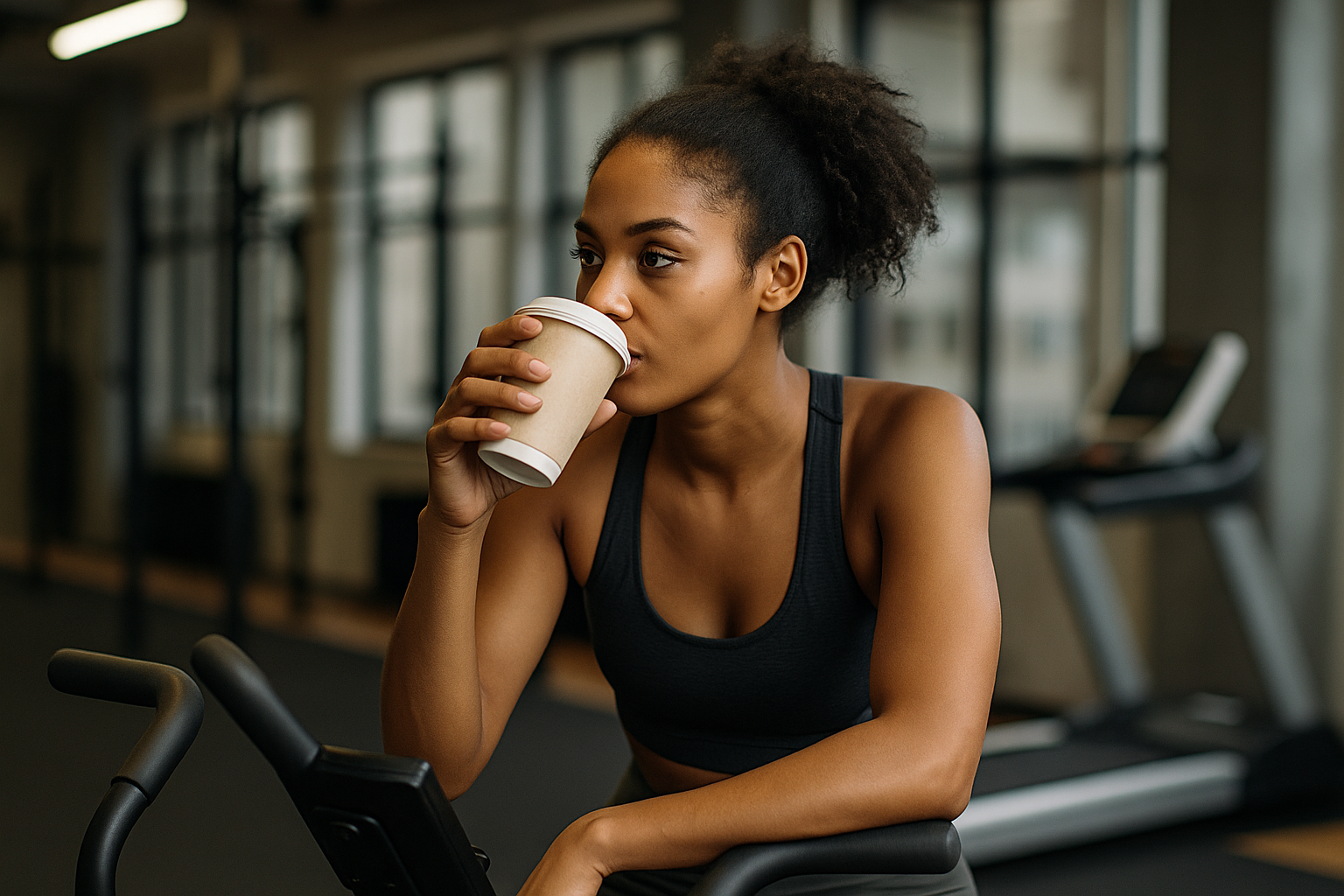If you’ve ever had a cup of coffee before hitting the gym or going for a run, you’ve likely felt a noticeable difference. Increased energy, better focus, and a stronger drive to push through your routine.
But is drinking coffee before exercise actually a good idea—or just another fitness trend?
Caffeine, the natural stimulant in coffee, has been studied for decades in the context of physical performance. And research shows that, when consumed in the right way, coffee can be a powerful and healthy addition to your workout routine.
In this article, you’ll learn how caffeine affects the body during exercise, the ideal timing and amount to consume, and how to use coffee as a performance booster—naturally and safely.
How Caffeine Impacts the Body During Exercise
Caffeine works primarily by blocking adenosine, a brain chemical that makes you feel tired. This results in increased alertness and reduced perception of effort.
But its benefits go beyond just waking you up. Here’s what happens when you consume caffeine before working out:
- Enhanced endurance: You may be able to exercise longer before fatigue sets in.
- Improved focus: Mental clarity and motivation improve, especially during repetitive or long workouts.
- Increased fat utilization: Your body may shift to using more fat for energy, conserving muscle glycogen.
- Better reaction time: Especially helpful in sports and quick-paced activities.
These effects are most noticeable during aerobic or endurance-based activities like running, cycling, or HIIT workouts—but caffeine can also support strength and power training.
Coffee vs. Other Pre-Workout Supplements
Many people rely on commercial pre-workouts filled with synthetic caffeine, artificial flavors, and unpronounceable ingredients. Coffee, on the other hand, is a natural alternative that’s affordable, accessible, and contains antioxidants in addition to caffeine.
One standard cup of coffee contains roughly 80–100 mg of caffeine, which is comparable to the amount in many branded pre-workouts—but without added sugars or preservatives.
You also have more control over the dose and preparation. Prefer a strong espresso? Go for it. Want something lighter? A small cup of black coffee will still deliver results.
Best Time to Drink Coffee Before Exercising
Timing your coffee is key. Caffeine usually begins to affect the body 15 to 45 minutes after consumption, with peak effects around 60 minutes.
To maximize benefits, aim to drink coffee about 30–60 minutes before your workout. That way, the stimulant effects kick in just as you begin training.
Avoid drinking coffee too close to your workout if you’re doing high-intensity cardio or sensitive to caffeine, as it can cause jitteriness or an upset stomach in some people. Drinking water along with coffee can help reduce these effects.
How Much Coffee Should You Drink?
The optimal dose of caffeine for exercise is about 3–6 mg per kilogram of body weight. For most people, this translates to one to two cups of brewed coffee.
For example:
- A person weighing 70 kg (154 lbs) would benefit from 210–420 mg of caffeine.
- That’s roughly 2.5 to 4 standard cups of coffee.
If you’re new to drinking coffee before workouts, start with a smaller dose (around one cup) to see how your body responds. Too much caffeine can lead to increased heart rate, anxiety, or digestive discomfort.
Benefits for Different Types of Exercise
Let’s break down how coffee helps with various types of physical activity:
Endurance Training (Running, Cycling, Swimming)
- Improves stamina and helps delay fatigue
- May enhance pace and distance capacity
Strength Training (Weightlifting, CrossFit)
- Increases energy and mental focus during heavy lifts
- Reduces perceived effort, making hard sets feel more manageable
HIIT and Cardio Workouts
- Boosts intensity and focus
- Helps maintain drive during high-repetition movements
Mind-Body Workouts (Yoga, Pilates)
- Can improve mental alertness without making you jittery if consumed in low doses
- Helps create a sense of calm energy when taken with a light meal
The versatility of coffee makes it suitable for nearly every type of movement.
Should You Add Anything to Your Pre-Workout Coffee?
Coffee is effective on its own, but some additions can support your energy or digestion.
- Cinnamon: Has anti-inflammatory properties and stabilizes blood sugar
- A splash of milk: Slows down absorption slightly, helping to avoid a crash
- Coconut oil or MCT oil: Used in bulletproof-style coffee for sustained energy
- Honey: Adds a bit of natural carbohydrate if you’re doing a longer workout
Avoid heavy creams or sugary syrups that can cause sluggishness or upset your stomach during training.
Coffee and Fasting: A Natural Combo?
If you practice intermittent fasting and work out in a fasted state, coffee can be a useful companion. Black coffee is nearly calorie-free and doesn’t break your fast, but still gives you a mental and physical edge.
In fact, many people who do fasted cardio or morning weightlifting rely on coffee to help maintain energy and motivation before their first meal.
That said, listen to your body. If you feel lightheaded or fatigued, consider adding a small snack before working out.
Are There Any Risks to Consider?
Coffee is generally safe for most people, especially in moderate amounts. But a few precautions are worth mentioning:
- Don’t use coffee to mask fatigue from poor sleep or overtraining
- Avoid combining coffee with other caffeine sources unless you know your tolerance
- Be mindful of dehydration, especially during hot workouts—drink water too
- If you experience anxiety, rapid heartbeat, or dizziness, reduce your caffeine intake or switch to decaf options
As with all things, balance is key.
Building a Consistent Routine
Consistency brings results. Try drinking coffee before workouts on specific days of the week so your body becomes familiar with the routine. This helps you tune into how coffee affects your performance over time.
For example, use coffee before longer runs or tough training days, and skip it on light recovery days. This keeps caffeine effective when you need it most.
You can also track your workouts to notice if your performance improves with a pre-workout coffee habit. Increased reps, better times, and more motivation are all good signs.
Can Coffee Replace a Meal or Pre-Workout Snack?
While coffee boosts alertness, it doesn’t provide fuel. For best results, pair it with a small snack if you’re doing a longer or more intense workout.
Ideal light snacks include:
- A banana with peanut butter
- Whole grain toast
- Greek yogurt
- Oats with cinnamon and honey
The combination of caffeine and carbohydrates can support both mental focus and physical endurance.
Final Thoughts: Let Coffee Power Your Performance
Coffee isn’t just a morning ritual—it can also be your natural performance enhancer. When used mindfully, it improves energy, sharpens focus, and boosts endurance.
Whether you’re training for a race, lifting weights, or simply trying to move your body more consistently, a well-timed cup of coffee might be the push you need to show up and go hard.
Start with a small amount, experiment with timing, and listen to your body. With balance and consistency, coffee can become one of your best pre-workout habits—no expensive supplements required.

Marcelo Oliveira is a coffee enthusiast and content creator specializing in barista skills, brewing methods, equipment reviews, coffee-related health insights, and fascinating curiosities from the coffee world. With a deep passion for every step of the brewing process, he turns technical knowledge into accessible and engaging content for both beginners and seasoned coffee lovers. Marcelo’s goal is to help readers appreciate the full experience of coffee—from bean to cup.
